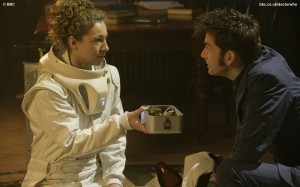Who Sunday and Pam Regis: Silence in the Library/Forest of the Dead, Steven Moffat
Pam Regis did the most brilliant comment on this double episode as a romance, so I’m putting it here so that nobody misses it. Here’s Pam:
Silence in the Library/Forest of the Dead
I have identified 8 elements that every romance novel has. They can occur in any order, there can be more than one instance of each, they can be inverted for ironic effect, and they can happen “off”—be reported rather than dramatized with action and dialogue. But they are always there, every one of them. For this reason, I believe that they have unusual resonance for any reader or viewer acquainted with courtship narratives. Meaning, everyone.
Steven Moffet has piled up most of them in these two episodes. Holy cow.
We’re in the 51st century. I’ll try to keep the time relationships straight as I talk about this. Wish me luck.
Meeting: Every romance has a meeting. The parties to the courtship have to meet. (I know, “Duh,” right? But think about how shimmery this moment in a romance can be. The meeting resonates.) Well, the whole of the two episodes is the meeting “scene” for Ten. River has met the Doctor, but Ten is not “her” Doctor, whom she will meet in Ten’s future. So, for Ten it’s the very first time, and for River it’s the first time she’s seen a Doctor this far back in the regeneration sequence. (Got that?)
Attraction: Why must the courting parties be together? Love is generally the answer to that question, but that little word covers a lot of territory. So, why? Conveying the attraction is River’s job in these episodes. Recall that River waxes positively rhapsodic as she talks about the Doctor. This puzzles Ten, brings him up short. Well, that’s something that the heroine usually does in a romance. She stops the hero cold. (Or warm.) River’s one more thing that Ten doesn’t understand about what is happening in the Library.
Barrier: Why don’t the courting parties achieve union on page 3 of the novel? Or, in the case of a TV show, at about minute 15? In this instance, Ten doesn’t know River. For River, Ten is the wrong Doctor. But because this is Steven Moffet, these two have, at some point, overcome their barrier, so we have, simultaneously (a word that is very difficult to use when talking about Who) a barrier and no barrier. In the now of the show, yes. In the arc of the myth, no. My head hurts.
Point of Ritual Death: Recall: union seems more impossible than ever, myth of Persephone, all that stuff. Well, in Who, because death is imminent throughout almost all of every episode, it’s easy to locate stuff that threatens the courting parties. Vashta Nerada anyone? But the scene in “Forest of the Dead” in which the Doctor and River fight it out to see who will provide additional memory for CAL to save the 4022 people killed by the VN, as well as Donna—that’s a “ritual” death that turns into a real death for River. The Doctor watches, handcuffed.
Declaration: Everyone says I love you. “I trust that man to the end of the universe. And we’ve been.” That’s River. And, “The Doctor, in the Tardis, next stop everywhere.” Ten? No.
Recognition: New information, often in the form of a revelation of identity, often self-identity, fells the barrier. River whispers the Doctor’s name to him. He recognizes her at that point as his wife.
Betrothal: An agreement to go forward together. Often marriage, but doesn’t have to be. This is represented by events in River’s diary—in her view, they are already betrothed—and by Ten’s realization that he will give her (his time stream)/has given her (the Doctor’s whole arc) his sonic screwdriver. Everyone should at this point be snorting at the symbolism. “It’s a screwdriver. It works in the dark.”
The eighth element is the disordered society or community that is put right somehow by the courtship. Library, Vashta Nerada, 4022 of those who were “saved” virtually now (there’s that word again) saved actually. River’s dead. Donna has lost Lee, the perfect man for her. The putting right is almost always partial.
All this in a story that is not centrally a courtship narrative at all.





